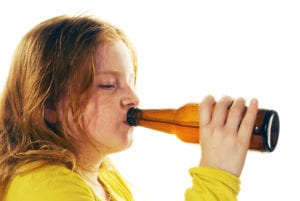Where do we learn to drink alcohol? Most people had their first taste of alcohol from one of two places: with their parents or with other people. Innocently, parents give alcohol to children so that they can feel included in adult activities. Sometimes parents use certain alcohol types medicinally, to soothe a baby or put a youngster to bed. Rarely do parents use alcohol abusively with children, though it does happen. By teenagehood, friends and peers either of the same age or an older age begin experimenting with alcohol. After not having been given any idea what the substance is like, their curiosity gets the better of them. Some teens experiment recreationally while others experiment more abusively. Recent research reveals that the type of drinking one does correlates with how they were introduced to alcohol. Published in the journal Psychological Medicine, the report found the difference. On the one hand, children who first had alcohol with their parents were more likely to be drinkers by the ages of fifteen and sixteen. Drinking meant to this study that the teenager was consuming full servings of alcohol, not just small samples or sips. On the other hand, children who first had alcohol from their friends were more likely to binge drink. In summary, young alcohol experimentation still leads to full alcohol experimentation in teenagehood, the manner of which, is dependent.
Binge Drinking
Binge drinking is defined as consuming enough alcohol to raise the blood alcohol content to 0.08 or above. Most often that is define as four drinks in two hours for women and five drinks for men. Full servings of alcohol vary depending on the beverage, for example, a full serving of beer is typically 6-8 ounces.
Research from around the world has revealed that most young people are unaware of how much is too much when it comes to drinking. It is little coincidence that teenagers who learn to drink from their parents have normal servings and those who learn from other young people drink too much. Binge drinking is not always a sign of alcoholism but it is a sign of alcohol abuse. Problematically, binge drinking in teenagehood can cause long term developmental problems or pave the way for future substance abuse issues.
Recovering from alcoholism is possible with treatment and clinical care. Avalon By The Sea provides excellence in substance abuse care from our beautiful estate in Malibu, California. If you are concerned you have developed a substance abuse problem with alcohol and are in need of treatment, call us today for a confidential assessment, 1 888-958-7511.











